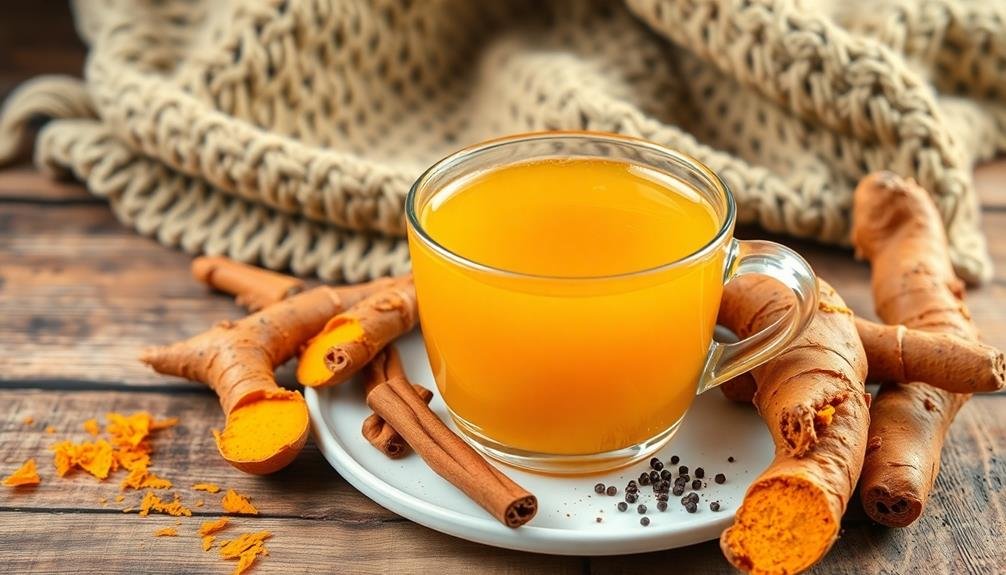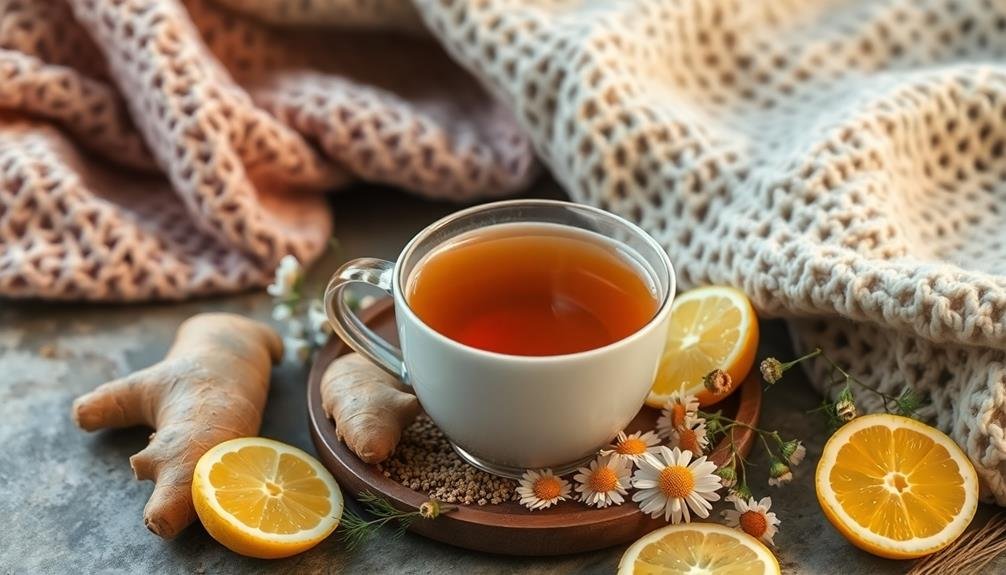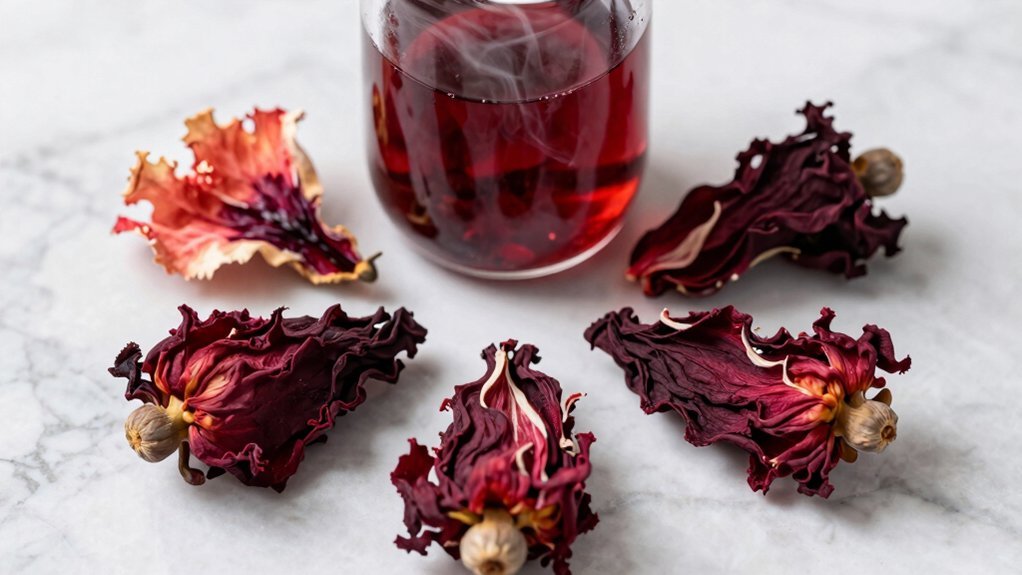When you're battling cold symptoms, herbal teas can be your best friend. Try Ginger Tea for inflammation and sore throats, and Peppermint Tea to clear your sinuses. Echinacea and Elderflower teas boost your immune system and ease discomfort. Chamomile helps you relax and sleep better, while Licorice Root soothes your throat. Turmeric Tea offers powerful anti-inflammatory benefits, and Lemon Balm may shorten your cold duration. Honey and Cinnamon Tea combines their soothing properties for relief. These teas not only comfort you but also help speed recovery. Keep exploring to discover their unique benefits and preparation tips!
Ginger Tea

When you're battling cold symptoms, the warmth of ginger tea can be a comforting remedy. This soothing drink not only warms you up but also offers numerous health benefits that can help you feel better.
Ginger contains natural anti-inflammatory properties that can reduce swelling in your throat, easing discomfort. Plus, it helps improve circulation, which can be particularly soothing when you're feeling achy.
To make ginger tea, simply slice fresh ginger root and steep it in hot water for about 10-15 minutes. You can enhance the flavor and benefits by adding honey and lemon, both of which can provide additional relief for sore throats and boost your immune system.
Just remember, moderation is key; too much ginger can lead to stomach upset.
As you sip your ginger tea, take a moment to breathe in the steam. The warm vapors can help clear your sinuses, making it easier to breathe.
Whether you're curled up on the couch or at your desk, this herbal tea can be a simple yet effective way to ease your cold symptoms and help you feel more like yourself again.
Peppermint Tea
When you're battling a cold, peppermint tea can be your go-to remedy.
It helps clear congestion, soothes your sore throat, and boasts natural antimicrobial properties that can support your recovery.
Let's explore how this invigorating tea can make a difference in your comfort and health.
Benefits for Congestion Relief
Peppermint tea offers remarkable benefits for relieving congestion, making it a go-to remedy during cold season. When you sip on this invigorating tea, the menthol in peppermint opens up your nasal passages, allowing you to breathe more easily. This natural decongestant helps to thin mucus, clearing out your airways and providing you with instant relief.
Additionally, the soothing warmth of peppermint tea can help ease the discomfort that often accompanies congestion. You'll find that its aromatic properties can break up phlegm and reduce sinus pressure, making it easier for you to enjoy your day without the nagging feeling of stuffiness.
Drinking peppermint tea regularly during a cold can also keep you hydrated, which is essential for maintaining overall health and wellness. Staying hydrated helps your body fight off the infection more effectively, while also ensuring that your mucus membranes remain moist and functional.
Soothing Sore Throat
If you're dealing with a sore throat, sipping on peppermint tea can provide soothing relief. The invigorating flavor of peppermint not only tantalizes your taste buds but also helps ease discomfort. When you brew a cup, the steam carries soothing menthol, which can help calm irritated throat tissues.
To make your peppermint tea, simply steep fresh or dried peppermint leaves in hot water for about 5 to 10 minutes. If you like, add a bit of honey for extra sweetness and additional soothing properties. Honey coats your throat, offering a protective layer against irritation.
Drinking peppermint tea warm can also help keep you hydrated, which is essential when you're feeling under the weather. Staying hydrated can thin mucus and make it easier to swallow, further easing your discomfort.
Plus, the relaxing aroma of peppermint can help you unwind, making your tea time a comforting ritual.
Natural Antimicrobial Properties
As you sip on peppermint tea for relief, you're not just soothing your throat; you're also tapping into its natural antimicrobial properties. Peppermint has long been recognized for its ability to combat various pathogens, making it a potent ally during cold season. The menthol in peppermint acts as a natural disinfectant, helping to fight off bacteria that can exacerbate your symptoms.
When you drink peppermint tea, you're infusing your body with antioxidants that support your immune system. These compounds work to reduce inflammation, allowing your body to heal more effectively.
Plus, the soothing warmth of the tea opens up your sinuses, helping you breathe easier while the antimicrobial properties work to eliminate any lurking germs.
Incorporating peppermint tea into your daily routine can serve as a simple yet effective strategy to fend off those pesky cold symptoms. It not only provides immediate relief but also helps your body fight against the underlying causes of illness.
Chamomile Tea

Chamomile tea is a fantastic choice when you're battling cold symptoms due to its anti-inflammatory properties.
Not only can it help reduce inflammation, but it also acts as a soothing sleep aid, making it easier for you to rest and recover.
When you're feeling under the weather, a warm cup of chamomile might be just what you need to unwind and heal.
Anti-inflammatory Properties
One of the standout benefits of chamomile tea is its anti-inflammatory properties, which can help alleviate cold symptoms. When you sip on this soothing beverage, it works to reduce inflammation in your throat and nasal passages. This effect can relieve soreness and irritation, making it easier for you to breathe and swallow.
Chamomile contains antioxidants, such as apigenin, which contribute to its ability to combat inflammation. By drinking chamomile tea, you're not just enjoying a warm drink; you're also giving your body a natural ally in the fight against cold symptoms.
Moreover, you can enhance its anti-inflammatory effects by adding honey or lemon. Honey can further soothe your throat and add antimicrobial properties, while lemon boosts vitamin C, supporting your immune system.
Incorporating chamomile tea into your daily routine during a cold can provide you with a comforting and effective way to manage discomfort.
Soothing Sleep Aid
A warm cup of chamomile tea can work wonders as a soothing sleep aid, especially during cold season when rest is essential for recovery. This gentle herbal tea not only helps you unwind but also promotes better sleep, allowing your body to heal more effectively.
Here are three key benefits of chamomile tea for sleep:
- Calming Effects: Chamomile contains apigenin, an antioxidant that binds to receptors in your brain, reducing anxiety and promoting relaxation.
- Improved Sleep Quality: Drinking chamomile tea before bed can enhance the quality of your sleep, helping you fall asleep faster and stay asleep longer.
- Natural Remedy: Unlike over-the-counter sleep aids, chamomile tea is a natural option with fewer side effects, making it suitable for daily use.
To make the most of chamomile's soothing properties, brew a cup about 30 minutes before bedtime.
Allow yourself to savor the aroma and warmth as you sip. This bedtime ritual not only aids in sleep but also provides comfort during those chilly nights when you're battling a cold.
Echinacea Tea
When you're battling cold symptoms, Echinacea tea can be a powerful ally. This herbal remedy is well-known for its immune-boosting properties, making it a popular choice when you feel under the weather. Drinking Echinacea tea may help reduce the duration and severity of your cold, giving your body the support it needs to fight off the virus.
To prepare Echinacea tea, steep the dried flowers, leaves, or roots in hot water for about 10-15 minutes. You can sweeten it with honey or add a slice of ginger for extra benefits. The tea's earthy flavor can be quite soothing, especially when you're dealing with a scratchy throat or congestion.
Studies suggest that Echinacea can help stimulate your immune system, helping you recover faster. It's also believed to have anti-inflammatory effects, which can ease symptoms like sore throats.
Just keep in mind that while Echinacea is generally safe, it's best to consult with a healthcare professional if you have allergies or are taking other medications.
Incorporating Echinacea tea into your routine can be a simple yet effective way to bolster your health during cold season.
Lemon Balm Tea

Lemon balm tea is a soothing option that can help ease your cold symptoms with its calming properties.
It's not just about taste; this herbal tea offers several health benefits worth exploring.
Let's look at how to prepare it and get the most out of your lemon balm experience.
Health Benefits Overview
Many people find relief from cold symptoms with lemon balm tea, thanks to its soothing properties. This herbal tea isn't just comforting; it also offers several health benefits that can ease your discomfort during a cold.
Here are three key benefits of lemon balm tea:
- Antiviral Effects: Lemon balm contains compounds that may help fight viruses, potentially shortening the duration of your cold.
- Relaxation and Sleep Aid: If you're feeling anxious or having trouble sleeping due to cold symptoms, lemon balm tea can promote relaxation, helping you catch up on rest.
- Digestive Support: Cold symptoms often come with digestive issues. Lemon balm tea can help soothe your stomach and relieve discomfort.
Incorporating lemon balm tea into your daily routine during a cold can enhance your overall wellness.
Whether you're sipping it hot or cold, its calming aroma and flavor can provide a sense of relief.
Preparation and Usage Tips
Brewing a soothing cup of lemon balm tea is a simple yet rewarding ritual that can provide comfort during cold symptoms. To start, gather fresh lemon balm leaves or high-quality dried leaves. If you're using fresh leaves, a handful will do; for dried, about one teaspoon per cup of water works well.
Boil water in a kettle, and once it reaches a rolling boil, let it cool for about a minute. This prevents scalding the delicate leaves.
Place the leaves in a teapot or a mug, and pour the hot water over them. Allow the tea to steep for 5 to 10 minutes, depending on how strong you like it. Longer steeping enhances the flavor and benefits.
After steeping, strain out the leaves, and sweeten your tea with honey or lemon if desired. Enjoy your cup warm, as the heat can help soothe your throat and clear your sinuses.
Aim to drink this tea several times a day while you're feeling under the weather. Incorporating lemon balm tea into your routine may just provide the comfort you need to ease those pesky cold symptoms.
Thyme Tea
When you're battling cold symptoms, thyme tea can be a soothing remedy to have on hand. This herbal infusion isn't only comforting but also offers several benefits that may help you feel better.
Here are three reasons to brew yourself a cup of thyme tea:
- Antimicrobial Properties: Thyme contains thymol, a compound known for its ability to fight bacteria and viruses. This can help your body combat cold symptoms more effectively.
- Expectorant Qualities: If you're dealing with a pesky cough or congestion, thyme tea can help loosen mucus and phlegm, making it easier for you to breathe.
- Anti-Inflammatory Effects: Drinking thyme tea may reduce inflammation in your throat, providing you with relief from that scratchy feeling that often accompanies a cold.
To prepare thyme tea, steep fresh or dried thyme leaves in hot water for about 10-15 minutes.
Add a bit of honey or lemon for extra flavor and benefits. Sip this warm concoction throughout the day, and you might just find it eases your symptoms and helps you feel more comfortable.
Licorice Root Tea

Licorice root tea stands out as a deliciously soothing option for alleviating cold symptoms. This herbal remedy not only tastes great but also offers an array of benefits to help you feel better. Licorice root contains glycyrrhizin, which can help reduce inflammation and soothe your throat, making it easier to swallow when you're feeling under the weather.
When brewing licorice root tea, consider pairing it with other beneficial ingredients for enhanced effects. Here's a simple guide to help you mix and match your tea:
| Ingredient | Benefit |
|---|---|
| Ginger | Reduces nausea and inflammation |
| Honey | Soothes the throat and adds sweetness |
| Lemon | Boosts vitamin C and enhances flavor |
To prepare your licorice root tea, steep a teaspoon of dried licorice root in hot water for about 10 minutes. Add your chosen ingredients from the table for a comforting blend that warms you up and helps relieve your cold symptoms. Enjoy this delightful tea any time you need a little extra care while battling a cold!
Elderflower Tea
Elderflower tea offers a revitalizing and aromatic option for soothing cold symptoms. This delightful brew not only tastes great but also packs a punch when it comes to health benefits. When you sip on elderflower tea, you may experience relief from your cold symptoms thanks to its natural properties.
Here are three significant reasons to include it in your wellness routine:
- Anti-inflammatory effects: Elderflower contains compounds that help reduce inflammation in your throat and nasal passages, easing discomfort as you recover.
- Immune support: Rich in antioxidants, elderflower strengthens your immune system, helping you fight off colds more effectively.
- Hydration: Staying hydrated is essential when you're feeling under the weather, and elderflower tea provides a flavorful way to replenish your fluids.
To prepare elderflower tea, steep dried elderflowers in hot water for about 10 minutes, then strain and enjoy. You can add honey or lemon for extra flavor and additional soothing effects.
Next time you catch a cold, reach for a warm cup of elderflower tea and let its comforting properties work their magic.
Turmeric Tea

If you're looking for a powerful ally against cold symptoms, turmeric tea might just be the perfect choice. This vibrant golden drink is packed with curcumin, a compound known for its anti-inflammatory and antioxidant properties. When you sip on turmeric tea, you're not only embracing a rich flavor but also potentially soothing that scratchy throat and easing congestion.
Here's a quick look at how turmeric tea can benefit you during a cold:
| Benefits | How It Helps |
|---|---|
| Reduces Inflammation | Helps soothe sore throats and body aches |
| Boosts Immunity | Supports your body's defenses |
| Aids Digestion | Eases stomach discomfort often linked to colds |
| Provides Comfort | Warmth can be soothing and relaxing |
To prepare turmeric tea, simply steep fresh or powdered turmeric in hot water, adding a pinch of black pepper to enhance absorption. You can also mix in a splash of lemon for an extra vitamin C boost. Enjoying this tea not only warms you up but also helps tackle those pesky cold symptoms effectively. So, why not give turmeric tea a try? You might just find it's your new go-to remedy!
Honey and Cinnamon Tea
After enjoying the soothing benefits of turmeric tea, you might want to explore another comforting option: honey and cinnamon tea. This delightful brew offers a warm hug in a cup, especially when you're battling cold symptoms. Honey and cinnamon not only taste great together, but they also pack a punch against discomfort.
Here's why you should give honey and cinnamon tea a try:
- Natural Antimicrobial Properties: Honey fights bacteria and viruses, helping to soothe your throat and ease coughing.
- Anti-Inflammatory Benefits: Cinnamon reduces inflammation, which can relieve congestion and promote easier breathing.
- Immune Boosting: Both ingredients work together to strengthen your immune system, making it easier for your body to fend off colds.
To make your own honey and cinnamon tea, simply steep a cinnamon stick in hot water, then stir in a spoonful of honey until it dissolves.
Enjoy this calming brew several times a day, and you'll feel the soothing effects in no time. Embrace the warmth of honey and cinnamon tea, and let it help you feel better as you recover from your cold.
Frequently Asked Questions
Can These Teas Be Consumed With Other Medications?
You should always check with your doctor before mixing herbal teas with other medications. Some ingredients might interact negatively, so it's best to guarantee your health and safety by consulting a healthcare professional first.
Are There Any Side Effects of These Herbal Teas?
Yes, some herbal teas can cause side effects like allergies, digestive issues, or interactions with medications. It's essential you check ingredients and consult a healthcare professional to guarantee they're safe for you. Stay informed!
How Often Should I Drink These Teas During a Cold?
You should drink these herbal teas as often as you need to, typically 2-3 times a day. They'll help soothe your symptoms and keep you hydrated, so listen to your body's needs.
Can Pregnant Women Safely Drink These Herbal Teas?
You should always consult your healthcare provider before drinking herbal teas during pregnancy. Some herbs can affect pregnancy, so it's vital to guarantee the teas you're considering are safe for you and your baby.
Is It Safe to Give These Teas to Children?
When considering giving herbal teas to children, it's important to consult with a pediatrician. Some herbs may not be suitable or safe for kids, so getting professional advice guarantees their health and well-being. Always prioritize safety.
In Summary
Incorporating these herbal teas into your routine can really help ease those pesky cold symptoms. Whether you're sipping on the warmth of ginger or the soothing notes of chamomile, each cup offers unique benefits. Don't forget to add a touch of honey for extra comfort! So, the next time you feel under the weather, reach for these natural remedies. You'll not only enjoy their delicious flavors but also give your body the support it needs to recover.





Leave a Reply